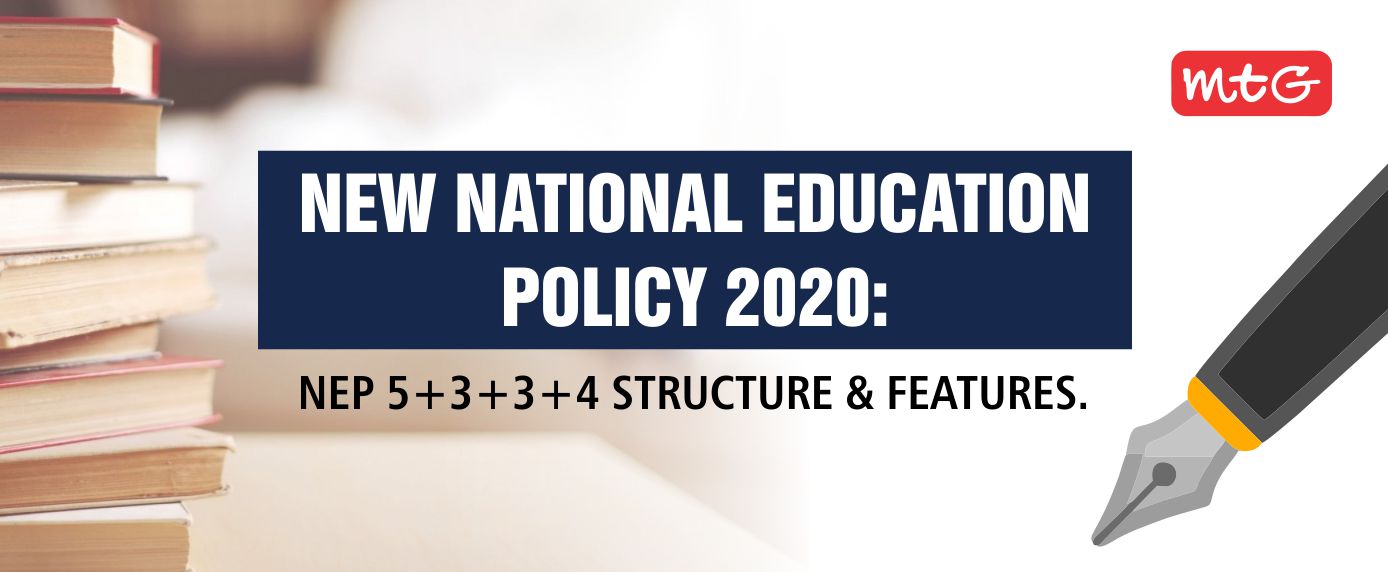
After 34 years, the first education policy of the 21st century has finally paved its path to transform the education system in the country promising a more successful structure. The Union Cabinet has given a green signal to a New Education Policy in schools and higher education by launching a New National Education Policy (NEP) on 20th July 2020. It is no surprise that the first-ever national education policy goes way long back in history. It was launched back in 1968, and the second education policy followed in 1986 which was finally implemented in 1992. The New NEP comes bearing a lot of good news and good fortune in the academic world. It is based on four thoughtful pillars which are Access, Equity, Quality, and Accountability. However, the most notable feature of this policy will be its newly formed structure of 5+3+3+4 which includes 12 years of school and 3 years of Anganwadi/pre-school replacing the old education structure which was 10+2.

Explaining the New National Education Policy 2020 Structure 5+3+3+4
| 5 Years Fundamental | 3 Years Preparatory | 3 Years Middle | 4 Years Secondary |
|---|---|---|---|
| Nursery @4 years | Standard 3rd @9 Years | Standard 6th @12 Years | Standard 9th @15 Years |
| Junior KG @5 years | Standard 4th @10 Years | Standard 7th @13 Years | Standard SSC @16 Years |
| Senior KG @6 years | Standard 5th @11 Years | Standard 8th @14 Years | Standard FYJC @17 Years |
| Standard 1st @7 years | Standard SYJC @18 Years | ||
| Standard 2nd @8 years | |||
- Curriculum and pedagogy in schools are being restructured to follow the new 5+3+3+4 pattern.
- The new curricular structure was created with learners at various stages of growth in mind, such as 3 to 8, 8 to 11, 11 to 14, and 14 to 18 years old.
- The first stage – the foundation stage will last 5 years, including three years of pre-primary education and grades one and two.
- Preparatory stage will be of 3 years: standards 3, 4, and 5.
- The middle stage of the upper primary will be of 3 years as well: Standards 6, 7, and 8.
- The secondary stage will be of 4 years: Standards 9, 10, 11, and 12.
Also Check: MTG Books by the new National Education Policy 2020
Has Covid-19 Affected NEP 2020 Timeline?
Much like everything else, Covid-19 Pandemic has affected the lives of students immensely. Where there is excitement for a new and better education system, the implementation of the New National Education Policy was hampered by the COVID-19 pandemic. However, according to the UGC Chairman, if the situation normalizes, it will be implemented at a faster pace. He also mentioned that a four-year integrated B.Ed program will be the minimum education qualification required for teachers by 2030. According to Education Minister Ramesh Pokhriyal Nishank, there are no plans to change the reservation norms & rules under the NEP.
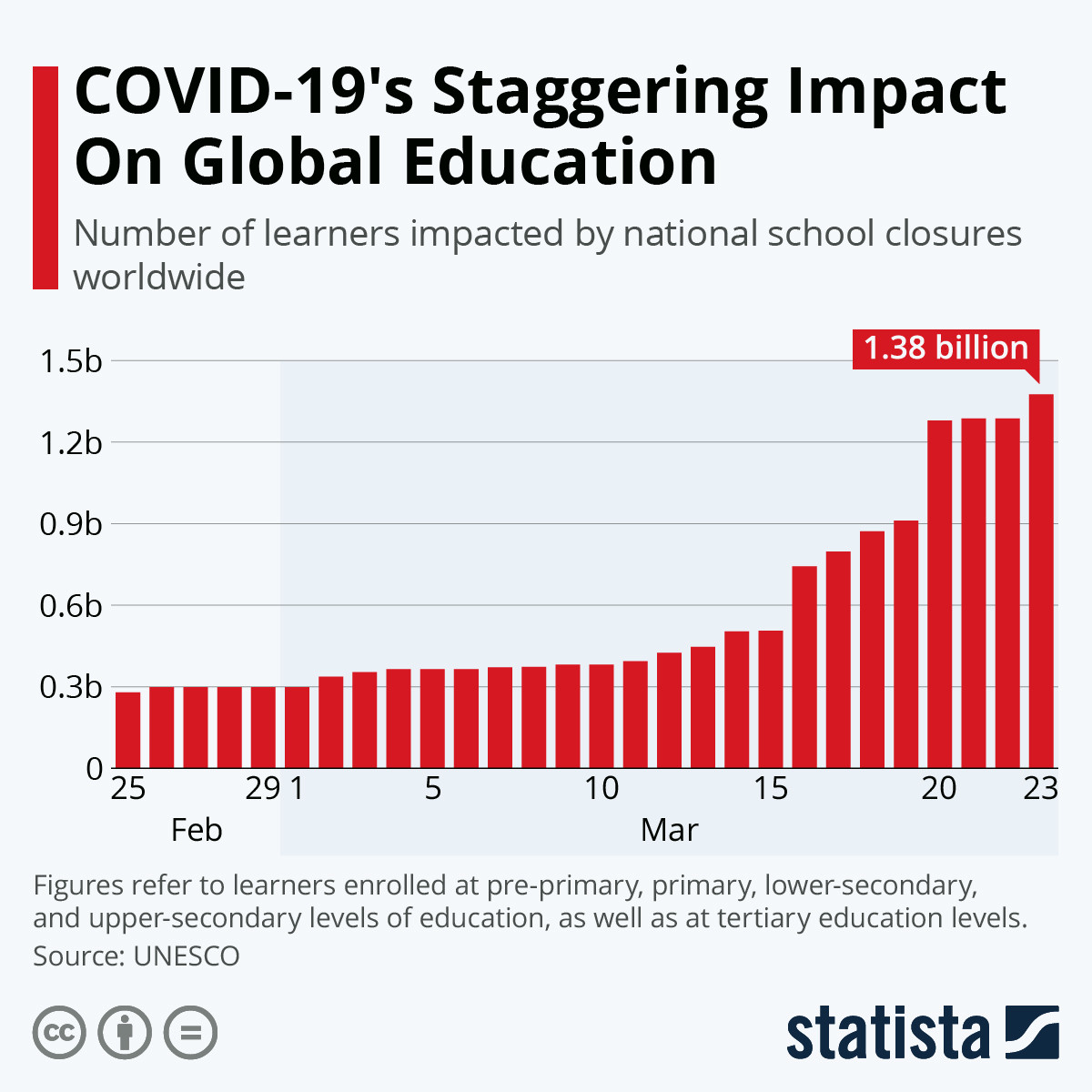
Meghalaya – The First State to Implement New NEP 2020
The acclaimed chief minister of Meghalaya, Conrad Kongkal Sangma, stated that the state of Meghalaya will be the first to implement the new education policy. The Chief Minister further stated that it will take effect after the COVID 19 epidemic has normalized. With the use of a new education system, the government will be able to place over 2 crore students in fields where they excel and require mentoring. He further mentioned that a task force will be formed to execute the New Education Policy and that Meghalaya will be the first state in the country to do so after the task force is formed.
You might also like Upcoming Engineering Exams in India 2022: Check Details Here!
Objective of the New National Education Policy
“The NEP 2020 envisions an India Centred education system that directly contributes to the evolution of our nation enduring into an equitable and vibrant knowledge society by giving them a top-class quality of education.”
There are 45 thousand colleges in the country and they hope to bring more than 2 crore students into the mainstream with this new education system. By the end of 2030, they hope to attain a 100% GER (Gross Enrollment Ratio) from pre-school to secondary education. The government hopes to make India a “global knowledge superpower” through the NEP 2020, and the only way to do so is to make the education system for schools and colleges more flexible, holistic, and multi-disciplinary, which would bring out their distinctive strengths. Our country’s education system and research facilities will grow more robust as a result of this new NEP, and students who have spent thousands on education in other countries will be able to obtain world standards in India.

Important Changes and Features of the New NEP 2020
- Board exams will only happen for class 12th standard, as 10th standard Board exams will be ceased now.
- Students no longer need to pursue MPhil for a Ph.D., rather MA students can do a Ph.D. directly.
- Students up to the 5th standard will be taught in their mother tongue, the local language, and the national language only. The rest of the subjects, even English, will only be taught as a subject.
- All schools will be taught under the 5+3+3+4 formula replacing the 10+2 structure.
- From standard 9th to 12th, the exams will be held semester-wise.
- The duration of a college degree will be of 3 and 4 years from now. The students who wish to pursue higher education will have to do a 4-year degree, whereas students who do not want to take higher education will do a 3-year degree. Moreover, the students doing a 4-year degree will be able to do a master’s in one year.
- The students will be eligible for multiple exit options and appropriate certifications after a period. They can get a certificate in the first year of graduation, an advanced diploma in the second year, and a degree in the third year.
- All students will be allowed to do other courses in between their ongoing courses. The student can do so by taking a short-term break for a limited time from their ongoing course.
- Many reforms have also been made in higher education. They include graded academic, administrative, and financial autonomy, etc.
- Many e-courses will be started in regional languages.
- Virtual labs will be developed.
- A national educational scientific forum (NESF) will be started.
- These changes and rules will be applied to all institutions whether, government, private, or deemed.
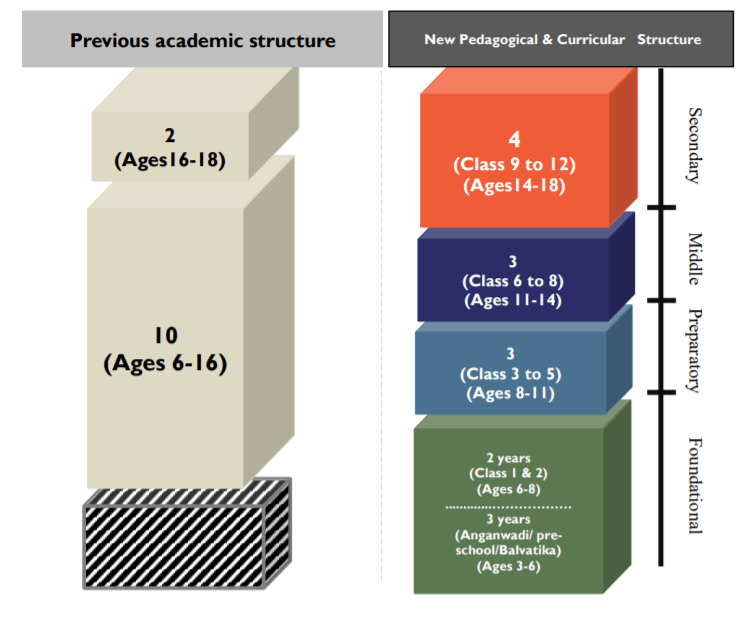
Children aged 3-6 are currently not covered by the 10+2 structure because Class 1 begins at age 6. A strong foundation of Early Childhood Care and Education (ECCE) from age 3 is also included in the new 5+3+3+4 structure, which is aimed at encouraging improved overall learning, development, and well-being of children. To ensure that all students entering Grade 1 are school ready and attain basic skills, universal provision of quality early childhood development, care, and education must be implemented as soon as possible, and no later than 2030. This will prepare students for understanding concepts better in coming standards.
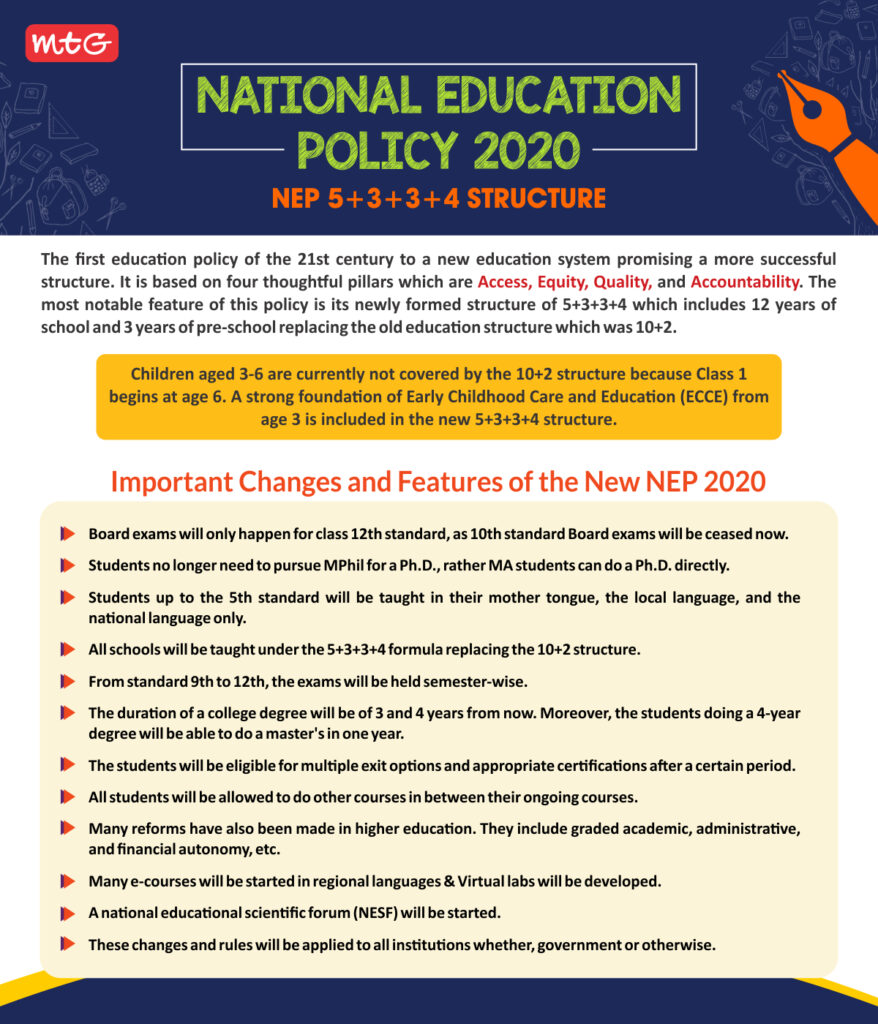
New National Education Policy 2020 for Higher Education
- Higher education is critical to enhancing human well-being and developing India, and through this NEP, they hope to boost their GER from 26.3 percent to 50 percent by 2035, as well as add about 3.5 million new seats to higher education institutions.
- Under this scenario, undergraduate education could last three or four years, with a variety of entry and exit options.
- Globally recognized multidisciplinary education and research universities will be established.
- The Higher Education Commission of India (HECI) would be the sole regulatory agency for all higher education in India (except medical and legal education).
- 4 independent verticals of HECI – NHERC (National higher education regulatory council) will issue a directive, GEC (General education council) will set standards, HEGC (Higher education grants council) will sponsor, and NAC (National accreditation council) would issue recognition.
- Aim for Higher education to become more global.
- An academic bank of credit will be developed, in which credit earned by students from various HEIs over their academic careers will be saved and transferred at the time of graduation.
- The National Research Foundation will serve as a centralized organization that promotes a strong research culture and expands research capability in higher education.

Reason Behind the New National Education Policy 2020.
Currently, there is a significant learning crisis in India, where children enroll in pre-primary school but fail to acquire basic skills. Hopefully, the foundations of learning for ECCE (Early Childhood Care and Education) would change that. By 2025, children aged 3 to 6 will have access to free, safe, high-quality, developmentally appropriate care and education as a result of this policy.
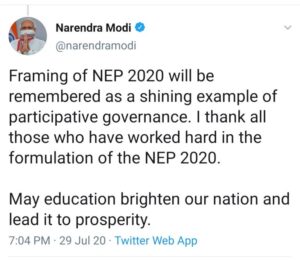
Minimum Education Qualification Requirement for Teachers
By 2030, a 4-year integrated B.Ed. A degree that teaches a variety of knowledge material and pedagogy and includes significant practical experience in the form of student-teaching at local schools will be the minimum degree qualification for teachers to pursue teaching. If there is a lack of teachers who speak a given language, additional efforts will be made and a program will be implemented to recruit teachers, including retired teachers, who can speak the local language necessary under the new National Education Policy.
Learning for Students in Mother Tongue
As we all know, young children learn more quickly when they are taught in their language rather than a foreign language, and this policy recognizes this as well, so they added a point in this new policy that children up to grade 5 will be taught in their mother language, but grade 8 can also be used if necessary.
- Textbooks will be available in their language as well, but if this is not possible, the language of interaction between the teacher and the students will be their native tongue.
- From grade 1 onwards, young children will be exposed to two to three languages, which will help them improve their speaking abilities, interaction, and recognition by grade three.
Secondary school students can choose a foreign language of their choosing, such as French, German, Spanish, Chinese, or Japanese, as an elective rather than as part of the three-language formula.
Financial Help for students
The national scholarship portal (NSP) will be enhanced to help, promote, and track children’s development so that they can get scholarships. Private higher education institutions would be encouraged to grant several scholarships to their children. Various forms of financial help for students will be made accessible. Students from the SC, ST, OBC and other SDGs will be rewarded for their achievements.
Curricular, Extra-Curricular, or Co-Curricular Activities?
Because no clear separation will be made between ‘curricular’ and ‘extra-curricular’ or ‘co-curricular activities,’ every student will have the option to engage in arts and humanities as well as the study of arts and science and social science.
- Yoga, athletics, dance, music, sculpting, woodworking, gardening, and electric work will all be deemed curriculum rather than extracurricular or co-curricular.
- NCERT will create syllabi and textbooks based on the NCF (national curriculum framework) so that these subjects can be included in the curriculum, which states that SCERTs (State councils of educational research training) can modify, rewrite, and supplement as needed.
- Physical education will be heavily integrated into their curriculum, taking into account what is enjoyable and safe for each age group.
- There is also no hard separation between the ‘vocational’ and ‘academic’ streams because they want every student to have an equal opportunity to develop both skills.
Preparing Students for the Outside World.
In the 12th five-year plan, it is calculated that only 5% of Indians aged 19 to 24 have obtained formal vocational education, which is far too low when compared to other countries such as the United States (52%), Germany (75%), and South Korea (96%). As a result, every child in grades 6 to 8 is required to study at least one occupational skill or more under this program.
- Basic knowledge of numerous livelihood and living skills such as gardening, woodworking, pottery, electric work, and others is important.
- They aim to have at least 50% of school and higher education students exposed to vocational education by the end of 2025.
- During Grades 6-8, all students will participate in a 10-day bagless session where they will intern with local vocational experts such as carpenters, gardeners, potters, artists, and others. Similar internship opportunities to learn vocational courses may be provided to kids in grades 6 through 12, even during the summer.
- Online vocational training will be made available as well.
- Children will be exposed to activities outside of school regularly through excursions to historical, cultural, and tourism sites, meetings with local artists and craftsmen, and visits to higher educational institutions in their village, Tehsil, District, and State.
Check Out: 10 Super Tips To Attain 100% Concentration on Studies
College Affiliation in NEP 2020
The new regulatory framework envisioned by this Policy will encourage an overall culture of empowerment and autonomy to innovation, including phasing out the system of “affiliated colleges” over fifteen years through a system of graded autonomy and challenge mode. Each existing affiliating university will be responsible for mentoring its affiliated colleges to help them develop their capabilities and meet minimum standards in academic and curricular matters, teaching and assessment, governance reforms, financial stability, and administrative efficiency. All colleges currently connected with a university must meet the appropriate benchmarks over time to gain the required accreditation and eventually become self-contained degree-granting colleges.
Implementing NEP 2020 in MTG School Books
Now that we all have talked about the changes and features of the new national education policy, we surely understand the benefits of implementing it. If you’re a guardian or parent of a student who will be one of these children to experience these changes, then you must have some thoughts on working on it? Apart from how schools will implement these changes, you will have a part in it too. How? By bringing home the best study material that is aligned with this new education policy. NEP aims to prepare children for the real world with more practical knowledge and digital experiences. Thus, there is nothing better than MTG school books to rely on because all the MTG books are prepared keeping the best NEP practices and changes in mind. The school books by MTG will provide practical knowledge via experiments and real-world problems. All books are curated by experts keeping the students’ well-being in mind to maximize their learning. Along with that, MTG provides E-books for students as the new NEP also aims to incorporate digital literacy with digital form of books. Hence, MTG School books are the just what you need to help your child cope up with these new changes to brighten their future.





























